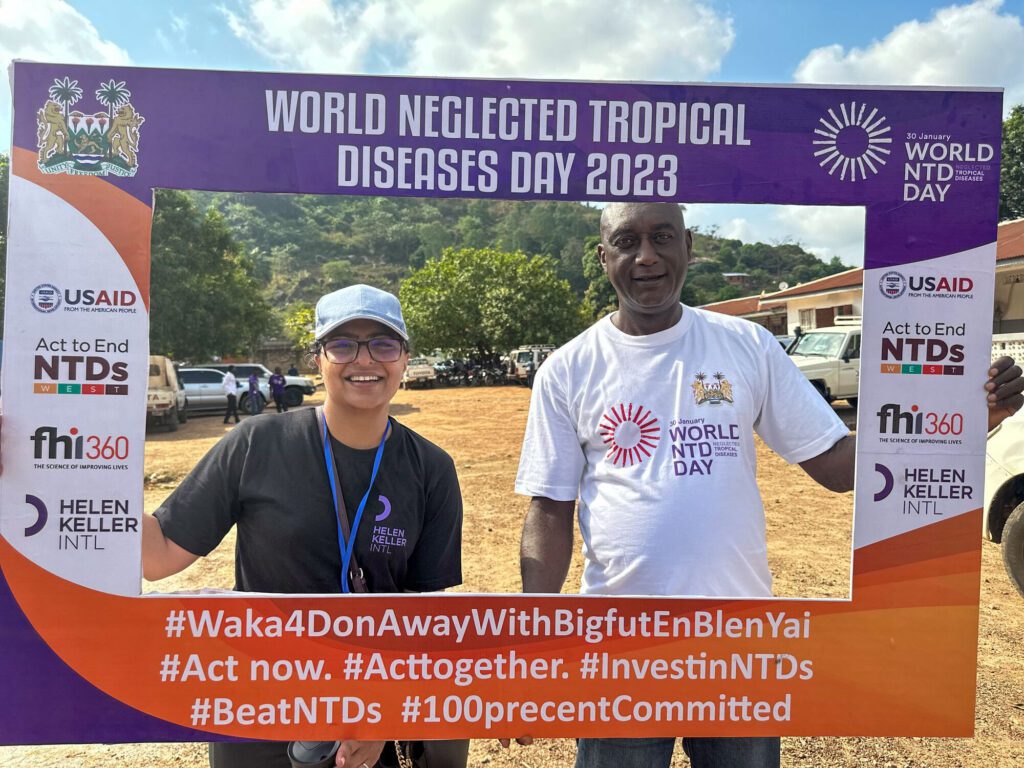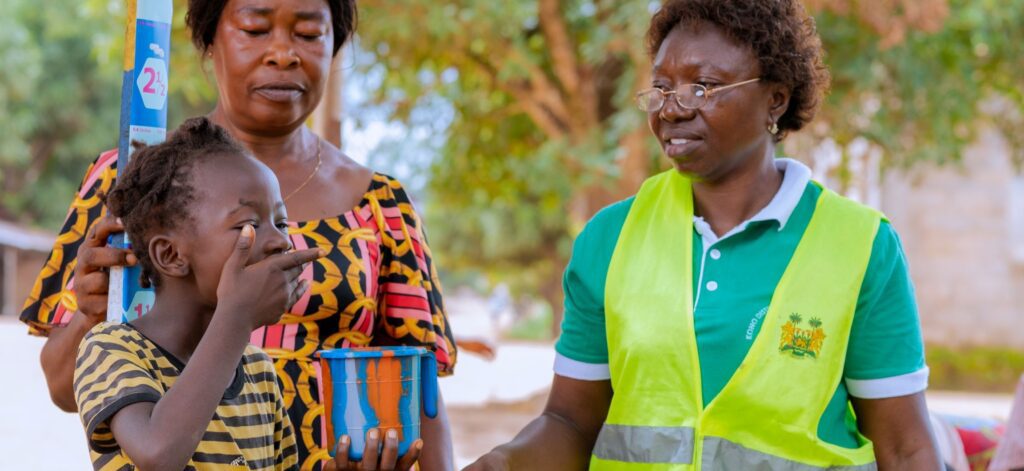Helen Keller Leaders Reflect on Lives at Stake from US Funding Suspensions
For decades, Helen Keller Intl has worked hand-in-hand with governments across Africa to eliminate neglected tropical diseases. Last year alone, we reached more than 35 million people and are close to eliminating a number of diseases in multiple countries. But earlier this year, that work and progress suddenly ended when the US Government suspended funding for thousands of programs, including USAID’s Act | West, which supports our neglected tropical disease work in six countries.
Our staff estimates that 100 million people in the countries we serve are now at risk from these diseases, which can cause blindness, disability, and disfigurement. We spoke to three colleagues leading this work to get their personal perspectives on the impacts of these funding reductions.
Benoit Dembélé, Regional Technical Advisor, Neglected Tropical Diseases

The impact of this work on people in West Africa was huge. It gave hope to communities that feel neglected and freed millions of people from blinding and disabling diseases. [The US government] was the backbone of fighting neglected tropical diseases in West Africa for decades. How do we maintain critical interventions like mass drug administration without this funding?
People will be reinfected, and we won’t be able to stop the transmission quickly. More people will go blind or have other long-term health problems, including children. In the past, people left villages because of diseases like onchocerciasis, but we’ve seen them return because of the medications we helped provide. They will lose confidence in us if we can’t provide regular treatments.
More people will go blind or have other long-term health problems, including children.
Benoit Dembélé, Regional Technical Advisor, Neglected Tropical Diseases
It’s been incredibly sad for our staff. Not just because so many are losing their jobs – that is really tough – but also because we will lose the progress we have made. We were so close to eliminating some of these diseases after 10, 15, or even 20 years of hard work. The staff feel like we didn’t achieve what we were supposed to for our communities. I want to give them hope, but I don’t have any answers for them. We built such strong trust with governments and communities. This is going to hurt our ability to develop partnerships in the future.
Sugandh Juneja, Country Director, Sierra Leone

We have made massive gains on the four diseases we were working on in Sierra Leone. And unfortunately, without this funding, we are going to lose these gains. The parasites that spread these diseases aren’t going away just because the US government has pulled funding.
These diseases can cause a host of disabling conditions, painful physical deformities, social stigma, and lost economic opportunities. Especially with diseases like lymphatic filariasis, there is a cultural aspect where people assume it’s witchcraft. It has taken a lot of work to dispel these myths, to make sure people understand this is not witchcraft – but the disease itself and how it spreads.
The parasites that spread these diseases aren’t going away just because the US government has pulled funding.
Sugandh Juneja, Country Director, Sierra Leone
We aimed to control neglected tropical diseases through mass drug administration programs involving about 30,000 community drug distributors. These passionate individuals are typically volunteers, paid around a $20 stipend. They do this work because they have seen their communities and families struggle and want to make a difference.
When I learned this work was terminated, I was devastated. Sierra Leone has gone through so much – years of civil war, then Ebola, then COVID – now mpox, Lassa fever, measles, all of that is happening as we speak. The US withdrawal won’t only affect our neglected tropical disease work; there are going to be massive gaps in reproductive health, malaria, and health systems – extremely critical work. I don’t know how the country is going to fill this massive funding gap, but we at Helen Keller are committed to doing everything within our power to support mothers, children, and families.
Mohamed Lamine Yattara, Country Director, Guinea and Niger

Guinea and Niger were both so close to eliminating trachoma, and Guinea had made incredible progress against lymphatic filariasis and onchocerciasis too. Niger just eliminated onchocerciasis last year. We were ready to celebrate when we got the news about the funding suspension. I was so shocked and disappointed. It feels like our mission to eliminate neglected tropical diseases, our years of fighting, will end without success.
As the name suggests, neglected tropical diseases often affect neglected and hard-to-reach places. Some communities don’t even have enough water. Without surveillance, even diseases that have been eliminated will come back – 14 million people in Guinea and 19 million in Niger will be at risk. This will be a massive loss for these communities and countries after more than 10 years of investment. We will have more people living with blindness and other disabilities who will struggle to earn an income and afford what they need to survive. These diseases can prevent people and even countries from reaching their true potential.
Without surveillance, even diseases that have been eliminated will come back – 14 million people in Guinea and 19 million in Niger will be at risk.
Mohamed Lamine Yattara, Country Director, Guinea and Niger
This is also heartbreaking because our colleagues on the frontlines of fighting these diseases are losing their jobs. In Guinea, we’ve had to cut half of our staff, and 11 staff in Niger. It’s so distressing for me to leave them without any salaries or resources.
We are engaging the governments to evaluate gaps and discuss how to fill them with the World Health Organization, bilateral donors, and other partners, but the gap is enormous. We need strong support from other donors to continue these critical activities, or it will be a dark point in these countries.










